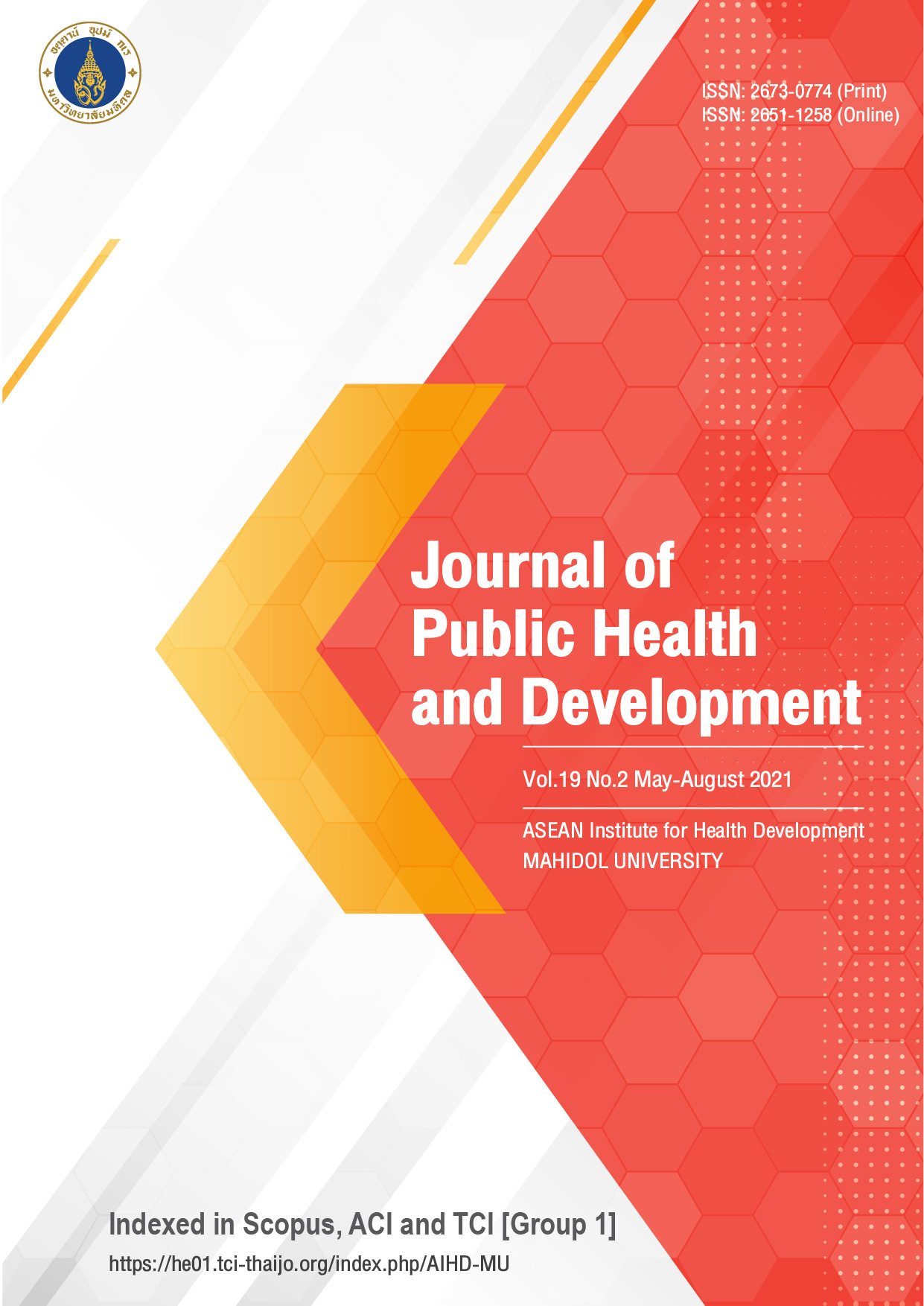The Rapid Expansion of Residential Long-term Care Services in Bangkok: A Challenge for Regulation.
Main Article Content
Abstract
As in other middle-income countries, Thailand is experiencing accelerating populationageing, with particularly rapid increases in the numbers of people at very old ages.This creates specific challenges related to meeting health and social care needsassociated with later life. This paper analyses the nature of residential long-term care(LTC) services in Bangkok and identifies different forms of provision. It also assessesthe suitability of current regulatory practices and provides some evidence of servicequality. The study applies a multi-method qualitative approach, using the key informantinterviews, focus groups and documentary evidence to piece together a “map” ofavailable services. It provides important insights including a very limited supply ofresidential LTC in Bangkok relative to the rapidly growing demand, scarce financialsupport to service providers, largely absent or in the early stage of state regulation, and a continued stigmatisation of residential LTC. While the research findings should beinterpreted with caution in part due to the limitations of available research or data onthese issues in Bangkok or elsewhere in Thailand, the limitation itself is a cause for concern, both reflecting and contributing to denial among policy-makers and society ingeneral.
Article Details

This work is licensed under a Creative Commons Attribution-NonCommercial-NoDerivatives 4.0 International License.
References
Prasartkul, P. et al. (eds). Situation of the Thai Elderly 2019. Bangkok: Institute for Population and Social Research, Mahidol University and Foundation of Thai Gerontology Research and Development Institute (TGRI). 2020.
Camarano A, Kanos S, Leitãoe MJ, Fernandes CD. Asinstituições de longa permanência para idosos: abrigoouretiro? in A.Camarano, ed. Cuidados de longa duração para a populaçãoidosa: um novo risco a ser assumido?. IPEA, Rio de Janeiro [Internet]. 2010 [cited 2019 May 7]. Available form: https://www.ipea.gov. br/portal/index.php?option=com_content&view=article&id=6586%3Acuidados-de-longa-duracao-para-a-populacao-idosa-um-novo-risco-social-a-ser-assumido&catid=166%3Adimac&directory=1&Itemid=1
Wong, YC, Leung J. Long-term care in China: issues and prospects. J Gerontol Soc Work. 2012;55(7):570-586
Lloyd-Sherlock P. Long-term care for older people in South Africa: The enduring legacies of Apartheid and HIV/AIDS. J Soc Policy. 2018;48(1):147–167
Lloyd-Sherlock P, Penhale B, Redondo N. Evaluating the quality of long-term care services in the city of La Plata, Argentina, Ageing Soc. 2019;1-23
Sasat S, Choowattanapakorn T, Pukdeeprom T, Lertrat P and Arunsaeng P. Long-term care institutions in Thailand. J. Health Res. 2013;27(6):41-418
Government Gazette. Ministerial regulations prescribing the care of the elderly or people with dependence to be other businesses in health establishments. 2020;137;(61):7-9
Lloyd-Sherlock P, Bastos Freire Neto J, Comas-Herrera A, Redondo N. Re: Covid-19: Why we need a national health and social care service. Care homes for older people and COVID-19: This is not just an issue for high-income countries. BMJ 2020; 369:1465.
Lloyd-Sherlock P. Barriers to linking research and policy: The case of long-term care in low- and middle-income countries. Population Horizons 2016;12(2): 62–67.
Knodel J, Teerawichitchainan BP. Family support for older persons in Thailand: Challenges and opportunities. Population Studies Center Research Report 17-879, Michigan: Population Studies Center, University of Michigan. 2017.
Lloyd-Sherlock P, Penhale B, Redondo N. The admission of older people into residential care homes in Argentina: Coercion and human rights abuse. Gerontologist. 2018;59(4): 610–618.
Knodel J, Prachuabmoh V, Chayovan N. The changing well-being of Thai elderly: An update from the 2011 survey of older persons in Thailand. Chiang Mai, Thailand: HelpAge International East Asia/Pacific Regional Office 2013.
National Statistical Office (NSO). Survey of older persons in Thailand; UN. World Populations Prospects: The 2017 Revision. 2017.
Sasat S. ASEAN+3 Research project on Care for older persons in ASEAN+3: The role of families and local and national support systems in Thailand. Bangkok: Collage of Population Studies, Chulalongkorn University and Department of Older Person, Ministry of Social Development and Human Security. 2018.
Department of Business Development, Ministry of Commerce (DBD). Number officialities registered for providing care for older people. 2018 [cited 2019 May 7]. Available from: http://www. dbd.go.th/ewt_news.php?nid=7485andfilename=index
Thai Elderly Promotion & Health Care association. 2018 [cited 2018 December 16]. Available from: http://www. tephca.org/en/
Mor VA framework for understanding regulation of long-term care quality. In V. Mor, T. Leone and A. Maresso (Eds.) Regulating long-term care quality: An international comparison, Cambridge University Press, Cambridge. 2014.
Wongpakaran N, Wongpakara T. Prevalence of major depressive disorders and suicide in long‐term care facilities: A report from northern Thailand. Psychogeriatr. 2012;12(1): 11-17
Tosangwarn S, Clissett P, Blake H. Predictors of depressive symptoms in older adults living in care homes in Thailand. Arch Psychiatr Nurs. 2018; 32(1): 51-56
Lee Y K, Kim S J. A study on the systematization of service quality management system of long-term care (LTC). Health and Social Welfare Review. 2012;32(4): 66–93
Ministry of Health and Welfare. Public Notice on Long-term Care Facilities Evaluation.Republic of Korea:Ministry of Health and Welfare. 2017;2017-223
Wu C, Gao L, Chen S, Dong H. Care services for elderly people with dementia in rural China: A case study. Bulletin of the World Health Organization. 2016;94(3):167-173.
Wang F, Meng LR, Zhang Q, Li L, Nogueira B, Ng CH, et al. Elder abuse and its impact on quality of life in nursing homes in China. Arch Gerontol Geriatr. 2018;78: 155–159.
Korea Centre for Investigative Journalism (KCIJ). 15.4 Billion won of long-term care benefits embezzled. KCIJ. October 6. 2019 [cited 2019 November 15]. Available from: https://newstapa.org/article/0LYW-
World Health Organisation (WHO). IPC guidance for long-term care facilities in the context of COVID-19.2020 [cited 2020 March 30]. Available from: https://apps.who.int/ iris/bitstream/handle/10665/331508/ WHO-2019-nCoV-IPC_long_term_ care-2020.1-eng.pdf


